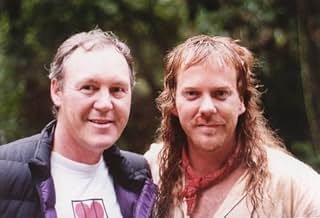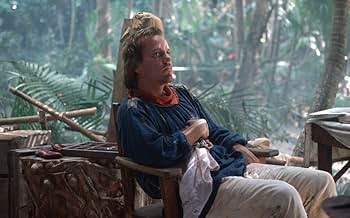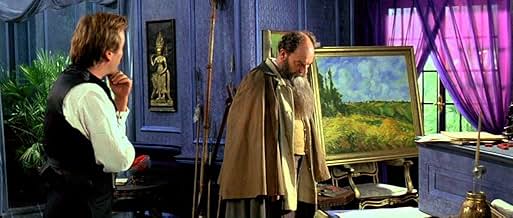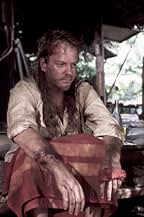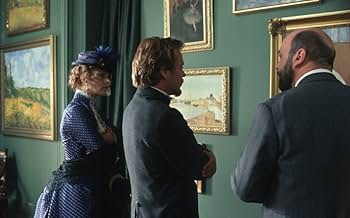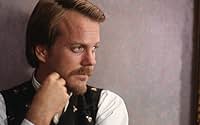A successful 19th century French stockbroker (Sutherland) leaves his profession to become an artist in Paris.A successful 19th century French stockbroker (Sutherland) leaves his profession to become an artist in Paris.A successful 19th century French stockbroker (Sutherland) leaves his profession to become an artist in Paris.
Jana Bittnerová
- Suzanne
- (as Jana Bittnerova)
Featured reviews
An absolutely dreadful rendition of Gauguin's life on Tahiti.There is no sense of his passion in a wonderful adventure in the South Seas and the real difficulties he faced.Having studied this painters life in some detail I find this biopiic unbelievably innacurate. We even have his wife Mette loving his paintings from Tahiti, which in reality she despised. There is even a scene of her at his exhibition in Paris, an event she refused to attend.She never appreciated any of his work. If a filmmaker or writer embarks on a biopic picture they need to keep the basic facts correct. The Directing and editing is very slow and not very entertaining. It is difficult to blame the actors with such a pedestrian script but I found the casting quite misguided. Gauguin must be quaking in his grave at this effort at portraying his brave and noble life in pursuit of his art.
5=G=
"Paradise Found" attempts to tell the story of Paul Gauguin (Sutherland) and flops. The film neither works as a biopic or a drama treating the subject only superficially, leaving gaping holes where important events belong, showing generally lackluster direction, and apparently fraught with low budgetness. Those interested in the life of Gauguin can learn more in a few minutes on the internet and those interested in a drama can easily dredge up something better on broadcast. Nonetheless, "Paradise Found" may have some value for Sutherland or Kinski fans or others who happen to surf it on broadcast as did I. (C)
My son Ruben Kraaijeveld worked on this movie for 4 weeks while we lived in Prague, acting as one of Gaugain's sons. I see all the other kids named in the crew listing: Jan, Emil and Pauline, but his name is missing. That's a real shame, since he worked hard for it and was only 9 (!) at the time. Movie itself I can't rate, we've been trying for years to get a copy but to no avail. Now I am going to look even harder, there must be a way to see my own kid play!!! He's been in a movie before, an Italian one that only showed in Italy and we also couldn't see. So I'd like to get info on both movies, Paradise Found and "The inverse canon" or "Canone Inverso", which was the Italian title of the movie. Anyone out there that can help maybe??? Thanks!
A romanticized look at Paul Gauguin's foray into post-impressionism in the late 1880's. As written by screenwriter John Goldsmith, Gauguin doesn't have a great deal happen in his life, cinematically. He gives up his brokerage job to paint, goes to Martinique, returns to France to become a leading artist in the new movement. Spends two years in Tahiti where he paints the islanders to critical acclaim. Back in Paris, he ruminates a few more years before returning to the South Seas for good.
Kiefer Sutherland does his best as Gauguin but can do little against a pedestrian plot. We see only a shade of the pain and frustration of an artist driven to create but unable to overcome a painters block. As a result, we cannot share in the exhilaration he feels when finally he achieves his goal. His wife, played by Nastassja Kinski, runs hot and cold to her husband's career choices and while she provides drama, does little to solicit our sympathy.
The narrative construction is not linear, which is unfortunate. We are constantly being thrust backwards and forwards in time which means constant mental adjustment and readjustment on the part of the audience. Not a good formula for success for a film of this calibre.
Viewed at the American Film Market in February.
Kiefer Sutherland does his best as Gauguin but can do little against a pedestrian plot. We see only a shade of the pain and frustration of an artist driven to create but unable to overcome a painters block. As a result, we cannot share in the exhilaration he feels when finally he achieves his goal. His wife, played by Nastassja Kinski, runs hot and cold to her husband's career choices and while she provides drama, does little to solicit our sympathy.
The narrative construction is not linear, which is unfortunate. We are constantly being thrust backwards and forwards in time which means constant mental adjustment and readjustment on the part of the audience. Not a good formula for success for a film of this calibre.
Viewed at the American Film Market in February.
This film, as far as I can remember, never had a commercial run here, or at least, this movie probably went to cable right after it's release in other countries. The idea of watching a biopic about Gauguin intrigued me since this painter had a turbulent career and his paintings, especially his Tahitian ones, revolutionized the art world.
As it has been pointed out by other contributors to this forum, Paul Gauguin had a difficult life. He was never clearly understood by his wife, or the general public he tried to conquer. He was a passionate man who left all the comforts in order to pursue an ambition that never gave him the happiness or economic security that others attained.
The screen play, not being linear, doesn't add much to the story. We are constantly taken back and forth, knowing little about the man. Paul Gauguin's family life was an unhappy one. His wife Mette never clearly understood him, nor stuck by him when he abandoned the brokerage house. Mette appears as a cold woman who never shared her husband's passion for the life he embarked.
Kiefer Sutherland's interpretation of the painter can go so far; he is hindered by an uninspired screen play. As far as his struggle with the local priest, who clearly wants to take the natives' culture away from them, is only a distraction. Actually, we see very little about the passion that consumed Gauguin during his time in Tahiti as he spends very little time doing what he went there for, in the first place: painting!
As it has been pointed out by other contributors to this forum, Paul Gauguin had a difficult life. He was never clearly understood by his wife, or the general public he tried to conquer. He was a passionate man who left all the comforts in order to pursue an ambition that never gave him the happiness or economic security that others attained.
The screen play, not being linear, doesn't add much to the story. We are constantly taken back and forth, knowing little about the man. Paul Gauguin's family life was an unhappy one. His wife Mette never clearly understood him, nor stuck by him when he abandoned the brokerage house. Mette appears as a cold woman who never shared her husband's passion for the life he embarked.
Kiefer Sutherland's interpretation of the painter can go so far; he is hindered by an uninspired screen play. As far as his struggle with the local priest, who clearly wants to take the natives' culture away from them, is only a distraction. Actually, we see very little about the passion that consumed Gauguin during his time in Tahiti as he spends very little time doing what he went there for, in the first place: painting!
Did you know
- TriviaKiefer Sutherland's father, Donald Sutherland, also portrayed the artist Paul Gauguin in the film Gauguin, le loup dans le soleil (1986).
- GoofsPissarro is misspelled "Pissaro" in the closing credits (but spelled correctly in the DVD captions).
- Quotes
Paul Gauguin: I have some advice of my own: you'd best mind your own fucking business.
- ConnectionsVersion of Gauguin Le Sauvage (1980)
- How long is Paradise Found?Powered by Alexa
Details
- Release date
- Countries of origin
- Language
- Also known as
- Gauguin: Diario de un genio
- Filming locations
- Production companies
- See more company credits at IMDbPro
Box office
- Budget
- A$10,000,000 (estimated)
- Runtime1 hour 33 minutes
- Color
- Sound mix
- Aspect ratio
- 2.35 : 1
Contribute to this page
Suggest an edit or add missing content



